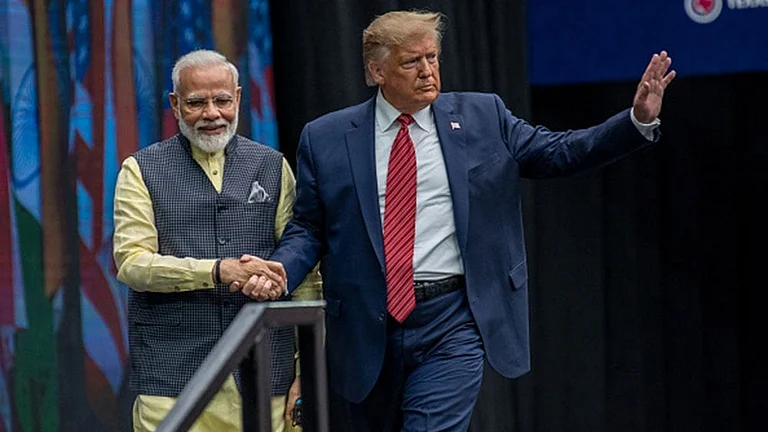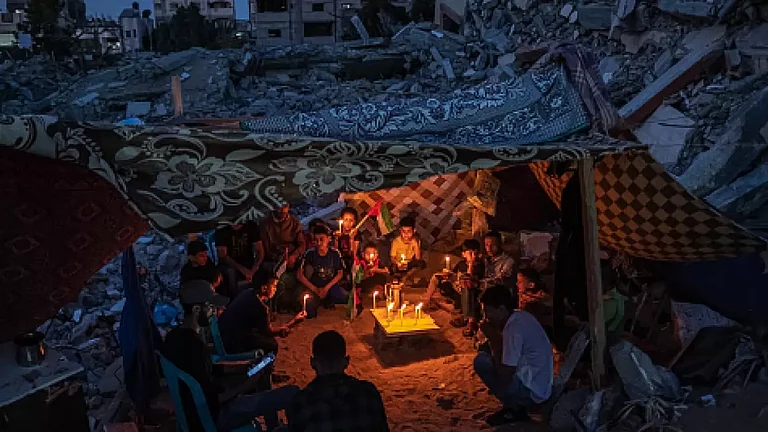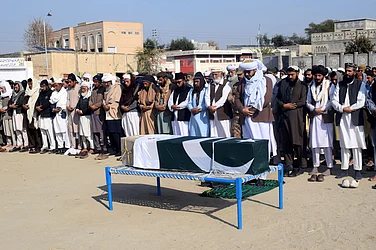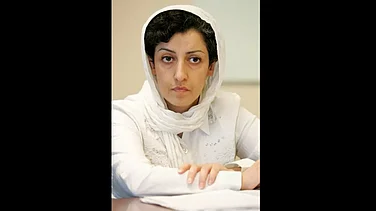After being tracked for a year as one of Gaza's most wanted men, Hamas chief Yahya Sinwar was killed by Israeli forces on October 17 in Rafah city, southern Gaza.
Israeli officials stated that Sinwar's killing "was coincidental and not based on intelligence" and that no hostages were involved, according to American news website Axios.
A small Israeli drone tracked Sinwar as he lay dying in the remains of a building in southern Gaza. Footage released by Israeli military shows him slumped in a dust-covered chair. With his right arm amputated, Sinwar is seen flinging a stick over his head in the direction of the approaching drone. For many social media users, this moment captured his "last act of defiance" against Israel.
According to Israeli officials, Sinwar was one of the masterminds behind the Hamas-led October 7 attack. The surprise attack on southern Israel killed more than 1,100 people and captured 250 others, who were taken to Gaza. Since then, Israeli forces have killed over 42,000 Palestinians.
Sinwar assumed overall control of the group following the assassination of Hamas politburo chief Ismail Haniyeh in Tehran in late July, which was widely believed to be carried out by Israel.

Sinwar was born in 1962 in the Khan Younis refugee camp in southern Gaza, where his parents had fled after being forced out of their home by Zionist militias during the 1948 Nakba, which resulted in the displacement of 750,000 Palestinians.
His path to resistance began during his university days, where he was first arrested by Israeli authorities in 1982 for anti-occupation activism.
Three years later, he was arrested again and subsequently met Ahmed Yassin, who would go on to found Hamas. By age 25, Sinwar had helped establish Hamas' internal security unit, al-Majd and earned a reputation for dealing with Palestinians who collaborated with Israel.
In 1988, Sinwar was arrested and sentenced to four life terms on charges of killing two Israeli soldiers and 12 Palestinians. During his 22 years in prison, he used his time to study Hebrew, Israeli literature, and politics. He also gave interviews to Israeli media outlets, presenting Hamas's political stances.
While in prison, Sinwar wrote a novel, "Thorns and Carnations", which tells the story of a Palestinian refugee family in Gaza's al-Shati refugee camp.
He was released in 2011 along with 1,000 other Palestinian prisoners in exchange for Gilad Shalit, a captured Israeli soldier who had been in Hamas custody in Gaza since 2006. Sinwar reportedly played a key role in arranging the Shalit prisoner release deal from within the prison.

He soon rose through Hamas' ranks after his release. In 2013, he was elected as a member of Hamas’s politburo in Gaza.
Sinwar was extensively involved in Hamas' political and military activities during the seven-week war with Israel in the summer of 2014. Months after the war, the United States designated he as a "specially designated global terrorist".
In a 2021 interview with Vice News, Sinwar stated, "We don't want war or fighting, because it costs lives...and our people deserve peace. For long periods, we tried peaceful and popular resistance. We expected that the world, free people and international organisations would stand by our people and stop occupation(Israel) from committing crimes and massacring our people. Unfortunately, the world stood by and watched."
"Does the world expect us to be well-behaved victims while we are being killed, for us to be slaughtered without making a noise?" Sinwar asked.
He was elected as the head of Hamas' political bureau in Gaza in 2017. Under his leadership, Hamas mended ties with Egypt's leadership and re-established relations with Iran after disagreements over the Syrian civil war.
Sinwar is believed to have had a major role in the formulation of Hamas' 2017 charter. This document, for the first time, accepted a Palestinian state on the June 1967 borders and recognised the PLO as the sole legitimate representative of the Palestinian people. The charter also excluded the movement’s hostility to Jews and stated that its conflict was with the Zionist occupation of Palestine.
In 2018, he played a leading role in organising the "Great March of Return" peaceful protests, which called for an end of the siege of Gaza and the refugees' right to return. Israeli soldiers brutally suppressed it, killing 230 demonstrators in the process.
For numerous Palestinians, Sinwar was a charismatic figure who earned respect for his defiance against Israel and staying in impoverished Gaza, unlike other Hamas leaders living abroad.
What Does Sinwar’s Death Mean To War On Gaza?
The killing of Hamas chief has fuelled speculation that Israeli Prime Minister Benjamin Netanyahu, under US pressure, might negotiate a ceasefire and secure the release of hostages held in Gaza.
Contrary to optimistic thinking, Aboubakr Khallaf, an Istanbul-based researcher specialising in Israeli affairs, says: “The most likely scenario is that the war will continue because the US is busy with the elections, which gives Netanyahu two more months during which he can impose force to remove Hamas from Gaza and Hezbollah from Lebanon."
In a recorded address on Thursday, Netanyahu made it clear the war is far from over. "Today, evil has suffered a heavy blow, but the task before us is not yet complete," he said.
Meanwhile, Khalil Hayya, the head of Hamas in Gaza, while confirming Sinwar's death in a televised address, reiterated the group's conditions for releasing captives. “They will not return until Israel stops its attacks on Gaza and withdraws its forces from the besieged enclave.”
Khallaf believes the war will continue until international powers intervene, pressuring Netanyahu to accept a ceasefire and compelling Hamas to step down from power.
As far as Hamas is concerned, the killing of Sinwar - coming just over two months after the assassination of Ismail Haniyeh - is definitely a blow to its leadership and internal stability. However, the resistance is far from defeated.
An expert on West Asian politics noted that it is the "persistent violence" that gave rise to figures like Sinwar in the first place. "The idea that eliminating individuals like him will discourage future recruits from fighting Israel is nothing but an illusion."
"The war has ruthlessly devastated Gaza's society with carnage and mass death," he added. "Hence, the emergence of a new phase of Palestinian resistance is all but unavoidable."






























